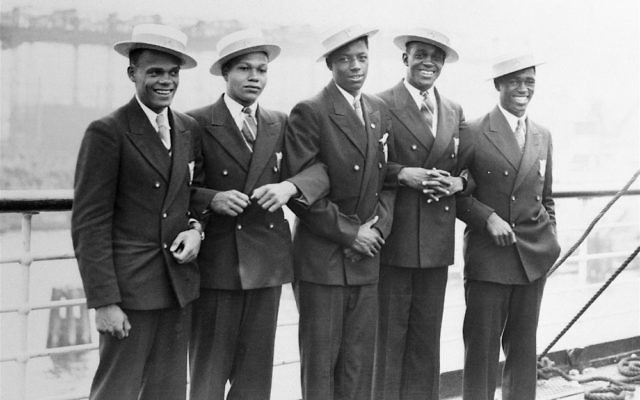AJFF: Pride and Prejudice in ’36 Olympic Glory
By Tiffany Parks
Jesse Owens wasn’t the only African-American athlete who won a gold medal at the 1936 Olympic Games in Berlin.
Seventeen other African-Americans competed in the 1936 Games, and Atlanta filmmaker Deborah Riley Draper’s documentary, “Olympic Pride, American Prejudice,” tells the fascinating journey of those forgotten athletes. The film has won the BronzeLens 2016 Audience Award and is nominated for the 2017 NAACP Image Award for best documentary.
The viewer will appreciate Draper’s voluminous, bold, narrative style and Blair Underwood’s compelling voice as the narrator. Underwood is also the executive producer of the film.
Through rare archival footage, interviews with current athletes and with the descendants of the 1936 athletes, and intense newspaper headlines, Draper establishes the raw tension surrounding the 1936 Olympics.

Steaming to Europe on the SS Manhattan in July 1936 are (from left) James LuValle, the bronze medalist in the 400 meters; Archie Williams, the gold medalist in the 400; John Woodruff, the gold medalist in the 800; Cornelius Johnson, the gold medalist in the high jump; and Mack Robinson, the silver medalist in the 200. Their story is told in “Olympic Pride, American Prejudice,” showing Jan. 27, Feb. 5 and Feb. 9.
Hitler’s anti-Semitic views were known worldwide, and the American Jewish community wanted the United States to boycott the Olympics if they were held in Berlin. But the Olympics would give African-American athletes a chance at a better life. The Pittsburgh Courier, an influential black newspaper, was solid in its stance: The Olympics provided the best venue to prove to Hitler and America the brilliance of African-Americans and strike a blow against racism.
After much debate, the U.S. Olympic team — including two black women, Tidye Pickett and Louise Stokes, and two Jews, Marty Glickman and Sam Stoller — went to Berlin.
The film mainly focuses on the medal-winning African-Americans: Jesse Owens, Ralph Metcalfe, Archie Williams, James LuValle, John Woodruff, Fritz Pollard, Cornelius Johnson, Dave Albritton, Jack Wilson and Mack Robinson.
The emotionally charged story continues at Berlin’s Olympiastadion as the athletes deal with racial politics and frustrations, including the agonizing moment when Pickett falls over a hurdle and is eliminated and the refusal to let Stokes, Glickman and Stoller compete.
The film suggests that Owens becomes an icon because of the media’s insatiable need to pit a gold-medal-winning African-American against Hitler’s racist ideology. Consequently, the rest of the athletes become footnotes, even though the media’s fascination with Owens eventually fades.
Draper’s documentary is not a nicely packaged story. It displays the ugliness of racism in America and in Germany. But there is the hint that America’s diversity and the promises of its Constitution will be forces for good in the long run. President Barack Obama flashes across the screen late in the film, and the athletes’ success should instill pride in the audience.




comments